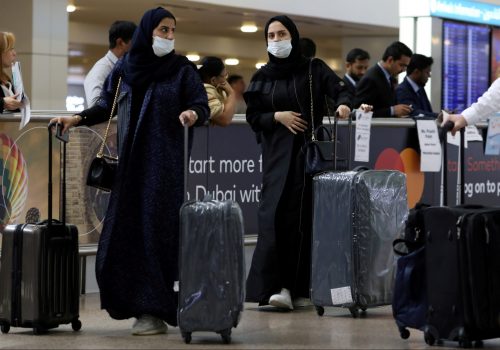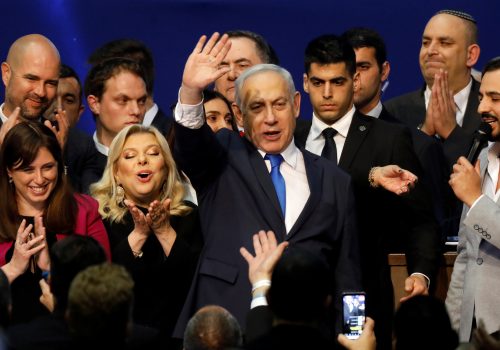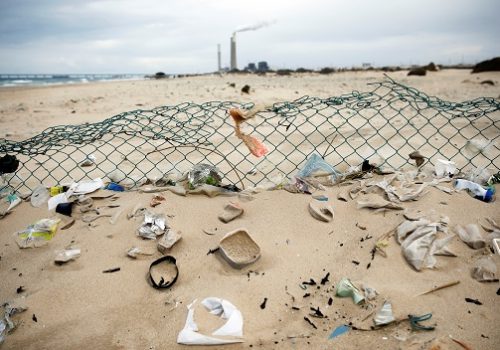Israel exemplifies how to respond to the coronavirus
How to treat a nation suffering from a year-long political crisis? A public health crisis is presumably not what the doctor ordered. Yet a disease like coronavirus does not care if you’re unable to form a government or if your prime minister is under indictment. Like over 100 other countries, Israel has come face to face with a slew of COVID-19 cases within its borders. Its efforts to limit the virus’ spread, which seem to be working well, may offer lessons for managing outbreaks elsewhere.
The government has used the full force of the law to contain the virus, which had infected 100 Israelis as of March 12. Besides communicating how severe the threat is—Prime Minister Benjamin Netanyahu called the disease the “worst pandemic” in a century—authorities have acted swiftly and decisively. Perhaps the most arresting regulation is making all returning international travelers self-quarantine for two weeks. Add that to the over 1,000 soldiers who have already been in quarantine, and the number of Israelis in isolation will surely skyrocket.
Other measures show how seriously the government is taking COVID-19. During the March 2 elections, quarantined voters assembled in polling stations built for their exclusive use. Compare this to the unsettling lack of election day measures in Iran, a country much worse afflicted by the virus. More recently, the health ministry has banned gatherings larger than 2,000 people and has issued new regulations for visiting hospitals and senior care facilities. The country has mobilized its renowned medical research sector, which hopes to ready a vaccine for testing within months.
Netanyahu has also committed masses of teens as well as the armed forces to cleaning public spaces and distributing medical supplies, while a chief rabbi has advised observant Jews to forgo the common practice of kissing mezuzahs (doorposts inscribed with prayers) upon entering and exiting rooms. Beyond its borders, Israel has in cooperation with the Palestinian Authority placed Bethlehem under quarantine and closed the entire West Bank to tourists. All this reveals one common thread from the powers that be: an unrelenting approach to the virus.
Yet such severe policies have severe consequences, particularly of the economic variety. Look no further than flag carrier El Al, which projects losses of $140 to $160 million from January through April due to cancellations and suspended routes. No small figure for an economy of around $400 billion. Other estimates put the cost of quarantine restrictions alone between $14 and $199 million. Prospects for the tourism industry are similarly grim as hotels and popular attractions grapple with plummeting business. Yet for a country in which security comes first, these financial sacrifices seem justified. Critics claim that such measures are undue in a free society, but their protestations will turn few heads in the government. Time will be the ultimate arbiter of how effective these policies are.
The Israeli case raises the question of whether other countries can and should follow its lead. For starters, a response of this magnitude can only take shape in the presence of strong institutions. The many weak states throughout the Middle East and beyond simply are incapable of doing as Israel has, from restricting the border to disinfecting public spaces. Jerusalem has orchestrated a coordinated, whole-of-government response that has brought together not only the national-security apparatus but also domestic policymakers. The same cannot happen in poorly governed places.
However, all countries can emulate how quickly Israel has responded. Recall 100 Israelis have actually tested positive— a considerable number in a nation of nine million but far fewer than what many other countries have reported. Any government can act now within its means to contain the virus. Though preemptive measures may incur great economic and social costs, the cost of inaction could be far higher. Assuredly Italy, shut down amidst thousands of infections, rues not doing more before its crisis spun out of control. Even if weaker states do not have the resources that Israel does, they can nevertheless do what they can while steering public discourse in a sensible direction.
Apart from material issues of public health, Israel’s response reveals the inherent tension between the police power and individual liberty that free societies must confront. It’s fair to say that the Israeli model is not feasible for the United States, where capacious civil liberties and inherent distrust of government render extreme policies legally and socially unworkable. But perhaps not so in other open countries that do not share such a sacrosanct view of civil liberties. Some European and Asian nations would do well to consider Israel’s example as they formulate their own coronavirus responses.
Nobody knows where the COVID-19 crisis will head. Yet if the World Health Organization naming the virus a global pandemic and the United States banning most travel from Europe is any indication, things are unlikely to calm soon. Israel’s stringent policies may help enlighten other nations in search of answers.
Daniel J. Samet is a program assistant for Middle East Programs.
Image: Israeli election monitors wearing protective gear count votes cast by Israelis in home-quarantine over coronavirus concerns (Reuters)


